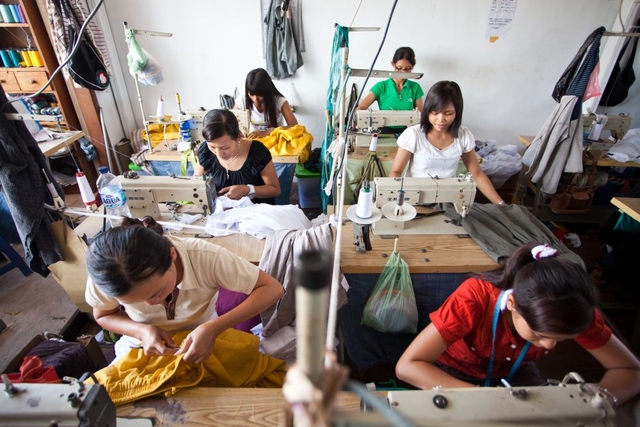What does PT stand for? How can one obtain a company work
license? Can the owner of the company hire themselves as an employee? And what
are the costs associated with processing all the necessary documents?

If you're considering starting
a business in Bali, this article offers answers to the most pressing questions.
It provides guidance to help you avoid mistakes that could waste time and
investments.
In the following sections, Satya Pramana Putra, the director
of Legal Indonesia, a company offering services for visa applications and
business establishment, will delve into the types of companies that foreign
citizens can establish in Indonesia. He will outline their differences,
registration procedures, and other key aspects of starting a business in Bali.
Entering Bali's entrepreneurial ecosystem
The initial step involves
arriving on the island and actively immersing oneself in its community. Many
entrepreneurial ideas encounter hurdles upon direct exposure to Bali. This is
because there could be a disconnect between concepts that appear promising
elsewhere and their compatibility with the local culture on the island, as well
as in Indonesia as a whole.
Bali in real life is quite
different from what social media presents. This is because the island's unique
atmosphere and character can't fully come across through photos or videos
alone. There's a distinct vibe, rhythm, and lifestyle here. Even if you're
certain about who you are and what you want from life, your perspectives can
quickly shift here.
Numerous entrepreneurs residing
on the island and operating businesses here have highlighted that they began
their journey with a tranquil introduction to Bali, attributing much of their
success to this approach. With an abundance of opportunities available on the
island, experiencing firsthand everything it has to offer is essential for
selecting your niche and understanding how to bring your ideas to fruition.

What types of companies can a foreigner establish in Indonesia and how do they differ?
Perseroan Terbatas (PT) is a Limited Liability Company (a legal entity whose
capital is divided into shares). In Indonesia, there are two types of Perseroan
Terbatas: PT PMDN (local company) and PT PMA (foreign investment company).
Typically, foreign citizens establish these two types of companies.
PT PMDN (Penanaman Modal Dalam Negeri) or local company
This type of company can only be fully owned by Indonesian citizens.
To establish a local PT PMDN company, you'll need:
- Two local shareholders
- One local director
- One local commissioner
In this setup, the company is registered under two Indonesian citizens
(the director and the commissioner). The director oversees the company's
management, deals with transactions, organizes operations, and bears legal
responsibility to the government. The commissioner serves a supervisory
function, overseeing the director's activities, reviewing reports, and
approving annual financial statements. These individuals usually receive a monthly salary (around $500-700) in addition to a contractual payment for registering the company under their name.
As a foreigner, you can act as the business sponsor, but in practice, you have no legal rights within the company.
However, there can be a protection mechanism in place: typically, a loan agreement is drafted to ensure that nominal owners have no claim to the company's profits.
If, for any reason, you encounter internal disagreements with your director
and/or commissioner, or if the company faces financial difficulties, you can
easily terminate the agreement and find new collaborators. Moreover, changing
ownership does not require dissolving the entire company.
You also have the option to participate in the company not only as a sponsor but
also as an employee, such as a general manager. This grants you eligibility for
a working KITAS (limited stay permit), which is tied to a particular company
and position, restricting you from working in other organizations or holding
multiple roles. However, this type of company does not qualify for an investor
KITAS.
Unlike PT PMA, which will be discussed below, PT PMDN does not have
restricted business activities (those that are not available for foreign
investment businesses). Therefore, this type of company can be very
convenient for those looking to open a business that falls within the
restricted business remit, such as beauty salons and cafes.
The only crucial step before starting this type of business is drafting
internal agreements and contracts within the company. These agreements are
discussed individually for each business with the help of legal specialists. At
Legal Indonesia, we provide these services to our clients.
PT PMA (Penanaman Modal Asing) or foreign investment company
In a PT PMA, the company's founders may consist of two or more foreigners,
whether they are legal entities or individuals. Together, they must hold 100%
ownership of the shares, and foreign capital involvement is obligatory.
The company's shares can be divided among the owners in almost any percentage ratio: 50/50, 30/70, 10/90, 1/99. It's important to note that an investor KITAS can be obtained by a company founder with a share of no less than 1,125,000,000 IDR, which equals 11.25% of the company's shares.
Please note that the requirement for a shareholder of PT PMA
to be an Indonesian citizen or a local company (PT PMDN) may arise if the
intended business activities are listed in the Negative Investment List (DNI,
Daftar Negatif Investasi – a document which regulates industries with
restricted access).
For example, for architectural and construction activities, a local co-founder company (PT PMDN) must hold a minimum of 33% of shares, while the remaining 67% can be owned by foreign founders.
On the other hand, "Beauty Salon" business is completely off-limits to PT PMA companies. This type of business is only available to local companies owned solely by Indonesian citizens. So, even if there are local co-founders in addition to foreign co-founders, this won't qualify the company as "local".
The list of activities restricted to PT PMA frequently
changes. For the latest information, refer to the OSS department's website.
For a company with foreign capital, the following are required:
- Two foreign individuals or legal entities
- One local or foreign director
- One local or foreign commissioner
If two people establish a company, one of them can assume the role of the
company director, and the other of the commissioner.

How much capital is required to establish PT PMA, and what documentation is necessary to provide evidence of it?
The start-up capital for PT PMA currently stands at a minimum of 10 billion IDR
(approximately $700,000). The OSS department, operating under the Ministry of
Investment, oversees this process and licenses PT PMA activities.
The injection of start-up capital following company registration is an
internal company matter. Founders can choose to deposit the start-up capital
into the company's bank account immediately or gradually within the company's
operational term. The start-up capital is intended to cover various business needs,
including investments. These funds should be in the company's bank account and
directly tied to its operations. Expenses categorized as investments include:
1. Land acquisition (applicable only to specific business activities).
2. Building purchase (applicable only to specific business activities).
3. Internal procurement: office equipment and consumables such as furniture,
computers, software, vehicles (motorcycles, cars), etc.
4. Overseas procurement: purchase of machinery including taxes, freight, and installation.
5. Other investments: legal fees, professional consultations, document
licensing, architectural design, transportation costs, employee salaries,
utilities (electricity, water, internet), tax obligations, office rent.
6. Operational funds (for 3 months): raw materials, office supplies,
salaries.
Demonstrating the deposit of the start-up capital is done
through a notarized statement. This document is signed by all members of the
Board of Directors, founders, and members of the Board of Commissioners of PT.
In this statement, they confirm their investment of this amount in the Indonesian
economy.
All financial transactions of the company, supported by
official documentation, must be regularly reported. Typically, financial
reports must be submitted every three months. Failure to report for a given
period means it needs to be included during the subsequent reporting period.
It's recommended to consult specialists regarding financial
reporting for your company, as they can offer tailored solutions suited to your
specific situation.
What if I'm unable to deposit the entire amount of start-up capital?
The most severe consequence for not depositing start-up
capital is revocation of the company's main business activity license.
However, if you consistently submit your financial reports on time, the OSS won't have grounds to initiate an audit. Yet, it's important to note that they may still conduct an investigation if any deficiencies are found in your reports.
What do I need to know about activity codes and licenses? Are there any limitations associated with them?
In Indonesia, there's a system of codes for business activities (KBLI -
Klasifikasi Baku Lapangan Usaha Indonesia). Therefore, prior to establishing a
company, it's crucial to identify the primary line of business. You can select
the main activity and several supplementary ones. While changing them during
operations is allowed, it's important to note that any alterations to company
documentation after establishment can be quite costly (starting from 10 million
IDR).
Importantly, the business activities you list when opening a company should
fall within the same field rather than being entirely different. This is
monitored by the OSS department. If you plan to establish a multifunctional
company, it's better to create several different ones.
Most activities in Indonesia require either a special premit or license.
Licences can be either free or paid. Paid licences range from 5 to 100 million
IDR. While most permits and licenses can be obtained through the OSS system,
some require application to the relevant government agency. For example,
activities related to education require approval from the Ministry of
Education. Similarly, activities related to finance require special approvals
from the Ministry of Finance or the central bank of Indonesia. Without this
document, you cannot open a bank account or start operating. This permission must
be obtained within three months of opening the company.
What documents are necessary to start the company registration process?
To register a company, founders need to provide photos or scans of their
passports.
They must also choose a company name. The name must consist of three
English or Indonesian words, with each word containing at least three letters.
Punctuation marks and ligatures are not allowed, and terms like
"company," "corporation," or "club" cannot be
used in the name.
If the company has a physical location for registration, you must
provide the land certificate, (IMB Izin Mendirikan Bangunan - building
construction permit), and the commercial lease agreement.
What about office space?
Every company in Indonesia requires a legal address. During registration,
you can choose to use your own address or rent one. However, there are
restrictions to note. Certain businesses like cafes, children's centers, water
tourism, and manufacturing must have a physical address. Conversely, for
trading, IT, consulting, tourist services provision, and tour booking, a
virtual address will do.
You can opt to provide either a physical or virtual address yourself. In
such instances, three documents are necessary:
- Commercial lease agreement
- Land certificate
- Building Permit (IMB)
You can also opt to rent a virtual address. For example, we
frequently offer these services to our clients, taking the burden of handling
necessary documentation off your shoulders. It's important to note, however,
that there are certain restrictions involved. For instance, you won't be able
to use the address for loan applications or bank transactions.
It's crucial to understand that virtual offices differ
significantly from PO Boxes. While virtual offices are only virtual in relation
to your company - it's registered there but doesn't physically occupy the
premises - they must still be associated with physical spaces. Regulatory
agencies often visit these locations, especially when important procedures like
opening a company account are involved. They may need to visit to photograph
the building and the space itself. Additionally, all official correspondence
will be sent to this address.
Another important detail to note is that all areas in Bali are divided into
zones based on the types of permissible activities. The OSS system regulates
the activities allowed in each zone. For instance, Seminyak imposes numerous
restrictions on activities conducted by businesses registered there, whereas
Denpasar has almost none.
There are also designated tourist zones and industrial zones. So if, for
example, you plan to engage in any kind of production, such as clothing or
cosmetics, your premises must be located in the allocated zone.
If at the time of company registration, you input an
activity type that isn't permitted in the area you specified under the company
address, you'll be denied the business license (NIB). Therefore, when selecting
premises for your business, it's essential to ensure beforehand that the chosen
area permits the intended activities.
When we assist our clients with opening a virtual or
physical address, we discuss all these details individually during
consultations, as each case has its own unique aspects.

How long does it take to open a company and what are the associated costs?
The company registration process concludes with obtaining
the business license (NIB), which currently takes around 2-3 months from
application. The duration depends on the number of business activities you
intend to conduct. Additionally, your business license is subject to approval,
and denials are rather frequent.
Prior to the introduction of legislative changes in
September 2022, company registration approvals took around 2-3 weeks regardless
of the number of specified business activities. Currently, it is only possible
to register a company within this timeframe if it has no more than two types of
specified activities.
Legal Indonesia's company registration services fee is 20
million IDR. This fee includes registration for two types of activities and
issuance of the business license within 2-3 weeks. However, if you plan to
include more than two types of activities, the cost and timeframe will be
calculated individually.
What should I know about taxation in Indonesia?
In Indonesia, there are two taxation systems:
1. Simplified system: This system entails a 0.5% monthly tax
on the total turnover of the company. It applies to companies with low expenses
that mainly generate profits. The simplified system is in effect for the
initial three years or until the company's turnover reaches 4.8 billion IDR
(approximately $250,000). After this period or upon reaching the turnover
threshold, the tax automatically switches to 22% of the company's net profit.
2. General system: This system involves a 22% annual tax on
the net profit. It is suitable for companies with expenses, such as equipment
purchases. Additionally, there are taxes on salaries, services, rent,
dividends, and other income sources.
With regard to company expenses, it's crucial to highlight a
common pitfall. Often, company founders use the corporate account for personal
expenses, such as paying for the director's accommodation. We advise against
such actions and recommend using company funds exclusively for growing your
business. This is because such payments could attract unwanted attention from
tax authorities.
How complex is the accounting reporting system?
One aspect involves maintaining monthly financial reports,
which form the foundation for the company's annual report submission.
Additionally, there's a monthly tax report. For instance, if
a company has employees, their taxes are paid monthly, necessitating the
submission of a corresponding report.
Moreover, there are investment reports outlining the
company's expenditures, including salaries, equipment purchases, legal fees, etc.
At Legal Indonesia, we have tax specialists and accountants
who oversee the entire organization of this process for our clients.
How is profit repatriation works, and what are the taxes on it?
Just as in any jurisdiction around the world, repatriating
money from an Indonesian company is quite challenging. The only way to
repatriate officially is through dividends at the end of the financial year. In
other words, a portion of the profit can be repatriated as dividends, subject
to a tax of 10% (if the shareholder has a personal tax number) or 20% (if no
personal tax number is available).
An alternative approach is withdrawing funds via the
salaries of the director and commissioner, though this incurs a progressive
income tax. This method may not be ideal for those aiming to withdraw
substantial sums from a company. For instance, withdrawals of up to 500 million
IDR incur a 25% tax, making this option less attractive.
What are the specifics of hiring employees? Can PT PMDN and PT PMA companies hire foreign nationals?
When hiring employees, there's a specified ratio between
local residents and foreigners, allowing one foreign employee for every five
Indonesian employees. In this scenario, a work permit, known as a KITAS, is
issued to the foreigner.
The process for hiring a foreigner under this arrangement is
as follows: first, an employment contract is drafted, then the foreigner
obtains a work permit (IMTA), and only after that, they can apply for a KITAS
visa.
Legal Indonesia can assist with KITAS processing. The cost
for these services is 15 million IDR, though the fee may vary based on the
package of documents provided.
There is a fixed mandatory tax for foreign employees,
amounting to $1200 per year. This tax is paid upon obtaining the IMTA work
permit, which then allows for the issuance of a KITAS work visa. Additionally,
there is a progressive income tax, ranging from 5% to 30%. The higher
the salary, the higher the tax rate.
However, it is important to know that certain jobs are out
of reach for foreign nationals. For instance, it's not possible for a foreigner
to work as a nail technician in a beauty salon. In such cases, foreign
individuals may need to consider related positions, such as a beauty
specialist, which typically involves hairstyling. The list of positions
available for foreign employees is periodically updated, so it's important to
check the availability of your desired position before applying for a work
KITAS.

What about dummy investors, also known as companies opened solely to obtain visas? How is this activity tracked, and what are the consequences of engaging in such practices?
First, let me explain the principle behind opening such
companies: a company registers under a dummy director, and the founders list
anyone they please. This is done in order to obtain KITAS visas for residency purposes.
Initially, everything seems fine, but after about six
months or a year, the status of such company as a dummy becomes evident during inspections conducted by the authorities. This is because it is impossible to maintain the appearance of a legitimate business when, for example, the director and comissioner are unfamiliar with each other or lack the necessary statutory documents.
The owners of these companies often face severe consequences, ranging from
hefty fines to deportation, with no right to re-enter Indonesia.
Investor KITAS is another popular attraction for dummy purposes.
But, whilst it is relatively easy to obtain an investor KITAS, it carries
significant obligations, such as a requirement to invest foreign capital and
conduct business in Indonesia.
Obtaining a work or investment KITAS for leisure or
residency purposes is quite reckless. These matters are
closely monitored by the OSS agency, in coordination with the immigration
office, and, as mentioned earlier, the consequences of breaking the rules can be quite unpleasant.
Legal Indonesia strongly advises against obtaining a KITAS
without genuine intentions of operating a legitimate business in Indonesia.
Agencies offering such services expose their clients to significant risks.
In a nutshell, starting and running a business in Indonesia
can feel overwhelming. The paperwork is packed with jargon and details, making
it easy to feel swamped.
But don't be discouraged! Many foreigners have built
thriving businesses here, from wedding planners to tech start-ups and even
laundry services.
The key? Trusting experienced legal and financial advisors
to assist you through the process.
At Legal Indonesia, we offer the guidance you need to
navigate each step with confidence, bringing you closer to achieving your
business objectives.
You can add one right now!